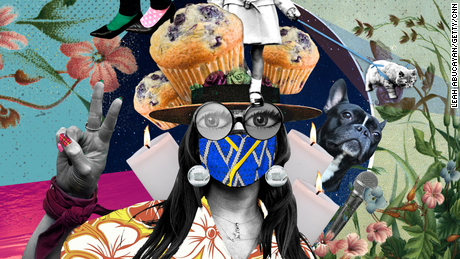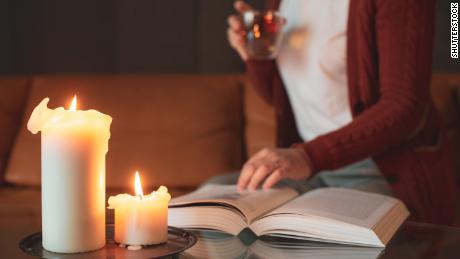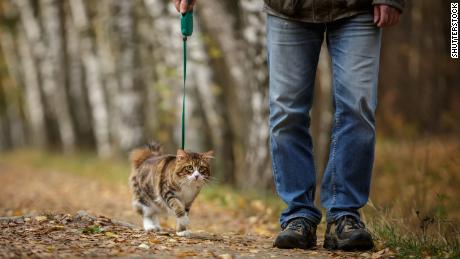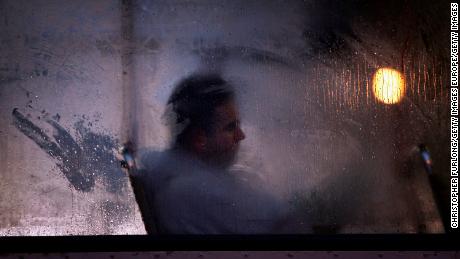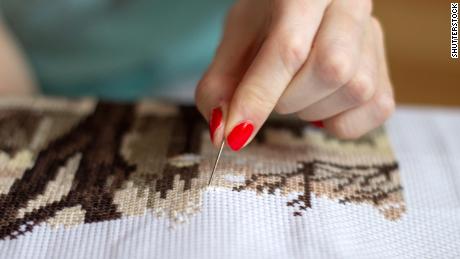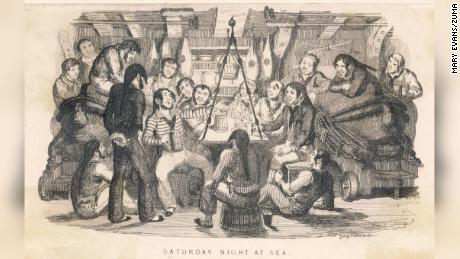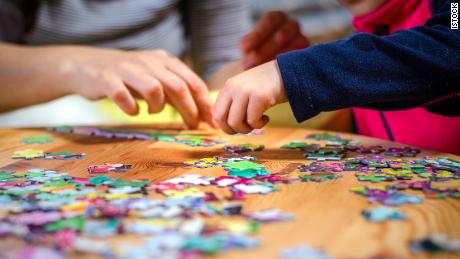(CNN)Normally reserved and conservatively dressed, my friend was outfitted in a strange mishmash of colorful wigs and Hawaiian shirts and a sequined gown. Her boyfriend was equally festively donned for New Year's Eve.
There may have even been multiple alcoholic beverages in her hands. I wasn't sure how it was possible to wear all of those things at once. More importantly, what had the universe done with my khaki-inclined friend who gravitated toward yoga and crudit├®s?
When I looked beyond my friend's metamorphosis into this unfamiliar and strange being over the past year, I realized it wasn't just her. I didn't have to look far to witness weirdness lurking at every turn.
"The pandemic has made me a little bizarre," said Mika Mooney, 38, a lawyer who lives in Long Island with her husband and three kids. "I now do everything by candlelight. I work with a candle lit, exercise, watch TV. My husband is scared I'm going to burn the house down!"
"Earlier today, I overheard a young woman holding the most beautiful blueberry muffin I've ever seen singing, 'ooh ooh blueberry muffin! I'm gonna eat you, blueberry muffin!'" said Noah Michelson, 40, a New York-based editorial director, via email. "At a different point in my life, I would have mocked her but now I feel like we'd be really good friends."
Whether it's a newfound disdain for modern appliances or a kindred connection with songs about baked goods, people's eccentricities seem to be leaking out of our pores. Is it possible that our brains have moved from panic to boredom to just plain weirdness the past 10 months since Covid-19 upended our normal lives?
Daring to be ourselves
It's possible that we're not getting weirder. Maybe we're relaxing into our authentic, uninhibited selves. After all, we don't have the constant barrage of people interactions to keep our quirks in check.
"During a crisis and isolation, many take an inventory of their lives and dare to be themselves, and engage in weird, creative, and non-conforming patterns," said Judith Zackson, a clinical psychologist based in Greenwich, Connecticut, via email.
Some of her clients are more outspoken than they were pre-pandemic, Zackson said. They have experienced changes in personal style, weird sleeping patterns and hobbies, and even sillier humor.
Of course, she also hears from people annoyed by their partners' stranger tendencies, which include apocalyptically hoarding food and supplies, and hobbies like collecting stones or walking their cat.
Mental health has been a real concern during the past 10 months of pandemic-induced stay-at-home orders. Anxiety and depression are up and social isolation may very well have long-term impacts we won't begin to even make sense of for years to come.
There is, though, the lesser studied phenomenon of people just becoming weirder. All those months devoid of normal human contact compounded with navigating the trifecta of a global health crisis, economic uncertainty and political division, and a lot of us are a little (or a lot) weirder than we were a year ago.
The image we sketch in our brain when we conjure the hermit is a disheveled man with wiry hair and crumpled clothes who mutters to himself and picks at plates of half-eaten food strewn all around an unheated cottage buried deep in the woods. I know I've felt like this man at least a dozen times in the past year.
Maybe we are WEIRD
Our proclivity to weirdness has a history that predates Covid-19.
Joseph Henrich, professor and chair of Harvard University's department of human evolutionary biology, came up with the acronym WEIRD -- Western, educated, industrialized, rich, democratic -- to describe the European culture that dominated the global stage for so long, as he outlines in his book "The WEIRDest People in the World: How the West Became Psychologically Peculiar and Particularly Prosperous."
Among the norms imposed was the stigmatization of incest. Marrying your cousin, a common practice in the United States in pre-Civl War times, started to become taboo in the late 19th century, when some states began prohibiting marriage between first cousins. The culture then became strange in that it departed from the rest of the world's social structures, which placed an emphasis on community or the whole of the society over the individual.
European culture, which very much informs today's American culture to the nth degree, shifted focus to personal pursuits, enabled in good part by the industrial revolution and the rise of wealth. The rise of individualism opened up the channels of differentiation and the increased possibility of people branching out to become their own, weird selves.
A little strange can be good
Being weirder isn't in itself a problem, though, according to Zackson. It depends on how weird you've become and what particular behaviors or actions develop as a result. It's possible, in fact, that being a little stranger is a good thing.
"Eccentric individuals see challenges and solutions from unexpected angles, and their weird thinking allows them to come up with innovative and imaginative solutions," Zackson said. "By choosing to march to your own beat, you can access your creativity, curiosity, happiness and make a difference in the world."
We need only to look to some of history's most eccentric public figures -- Lady Gaga, Prince, Andy Warhol, Sigmund Freud, Albert Einstein -- to know that weird has its benefits.
"I'm less weird (since Covid-19), but only because the things I like doing -- keeping to myself and staying home, needle crafting hobbies -- became mandated or more popular, not because I have changed," said Venus Carey, a New York-based database manager.
It's true that the labels that we've assigned people who we've historically deemed weird -- hermits, germaphobes and hypochondriacs -- have become completely normalized in an environment where we have to keep our distance from others and wash our hands until they are raw.
"I have always had a soft spot for eccentrics, and I have worked long and hard to be eccentric myself, with mixed results," said Andy Duncan, an English professor at Frostburg State University who studies weirdness and writes weirdness in the form of speculative fiction. He just filed his first UFO report, citing a sighting of moving and blinking lights in a recent night sky over his Maryland house.
"The eccentricity I value is essentially benign, a harmless individualism that reflects a unique, cockeyed view of the world, and spices up what otherwise might be a mundane menu," Duncan said.
"These eccentrics tend to be self-aware and tongue in cheek. They're winking at us. Some eccentrics, moreover, are just visionaries ahead of their time, like the early advocates of such eccentric notions as animal welfare."
Go for the weird (safely)
One part social isolation. Two parts ennui. Our weirdness might be both a subconscious relaxing of social norms and a deliberate attempt to replace lost social connections with self-entertainment by way of quirk.
So, maybe we talk to ourselves more than our 2019 selves would have deemed acceptable, or dress up in bizarre combinations of accoutrement found around the house when we tire of sweatpants. Why the hell not?
Go ahead and wear that dishrag on your head and rock out to Queen.
Sing operettas to your French bulldog.
Paint with your toes using past-ripe berries and a paintbrush fashioned from discarded cat whiskers.
Get CNN Health's weekly newsletter
Sign up here to get The Results Are In with Dr. Sanjay Gupta every Tuesday from the CNN Health team.
Wear two different socks and three hats and hang disco balls from your earlobes and dance to the beat of your own drum.
To each their own.
